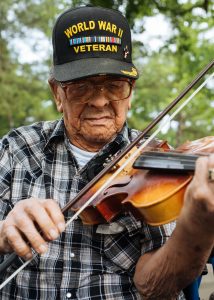Willie Durisseau
 Arnaudville, Louisiana’s Nouveau Electric Records is issuing a unique release on June 19, Creole House Dance, featuring 101 year-old Creole fiddler Willie Durisseau (1918-2019). Creole House Dance features two tracks, each comprising three small songs, some of which represent a pre-WWII Creole fiddle style that has never been recorded before. These performances were captured by Louis Michot (singer/fiddler of Grammy winners Lost Bayou Ramblers and founder of NER) on a Zoom stereo recorder at the Durisseau home in Spring of 2019. Creole House Dance will be released as a 45RPM vinyl 7,” digital download and via streaming platforms.
Arnaudville, Louisiana’s Nouveau Electric Records is issuing a unique release on June 19, Creole House Dance, featuring 101 year-old Creole fiddler Willie Durisseau (1918-2019). Creole House Dance features two tracks, each comprising three small songs, some of which represent a pre-WWII Creole fiddle style that has never been recorded before. These performances were captured by Louis Michot (singer/fiddler of Grammy winners Lost Bayou Ramblers and founder of NER) on a Zoom stereo recorder at the Durisseau home in Spring of 2019. Creole House Dance will be released as a 45RPM vinyl 7,” digital download and via streaming platforms.
As Willie and his wife Irma recounted their memories of the Creole house dances of the 1930s to Michot, Durisseau would pick up his fiddle and allow his fingers to recall the songs he and his late brother, Jimmy Durisseau, played back then in their native, Lebeau, Louisiana. In their community, musicians performed exclusively on fiddle(s) and guitar, with no accordion. Creole House Dance provides 21st century music lovers with a vivid snapshot of those celebratory weekly affairs.
Louis wrote about his encounters with Willie for the Louisiana Folklife Program:
“In a time when we look back to recordings to give us a glimpse of the roots of Louisiana French music, we sometimes overlook the deepest wells of information and experience in our own region — the elders who played at and attended the bals de maison. I was fortunate to be introduced to Willie and Irma Durisseau in 2019, who attended many house dances in their native Lebeau, Louisiana, throughout the 1930s. Willie was a Creole fiddler who played at the dances.
‘Willie Durisseau was born on February 20, 1918 in Mallet, and was raised in Lebeau, both communities in St. Landry Parish, Louisiana. His days as a Creole fiddler began in Lebeau, where he and his brother, Jimmie, made their first fiddles out of cigar boxes. They played house dances in the 1930s and were usually joined by one or more of their cousins, the Joe brothers: Aaron, Caffery, and Clarence. Of the two sets of brothers, they played fiddle or guitar, or both, but none of them played the accordion, and according to both Willie and Irma, they never had an accordion at their house dances in Lebeau.
“Willie eventually met Irma Doucet at one of these house dances, and the two were married in August of 1940. Irma stated that they played at and frequented house dances in 1938 and 1939, but that in 1940 much of the community moved to Beaumont, Texas, presumably for work. That same year Willie joined the United States Army and went to fight in Okinawa in World War II. Irma said they played a few small house dances after the war, but that these social gatherings soon faded as the community was not as strong as before the war, and Willie put down the fiddle to raise his family and work in construction. Willie and Irma later moved to Opelousas to raise their family, but the couple never let go of their heritage and memories of those days in Lebeau.
“In 2017, a family member bought Mr. Durisseau a new fiddle, and at the age of 99 he picked the instrument back up to recall some of the melodies from these dances over 80 years ago. As one can find it hard to imagine still playing the fiddle at 101 years old, Willie was able to carry a tune for about a minute at a time, and only a few tunes in the space of an hour, but the clarity and authenticity of the melodies flowed from his fingers like gold.
“I sat down with the Durisseaus for a series of informal interviews in April and May of 2019, along with Corey Ledet, a Creole Zydeco accordion player, Robin Miller, a local French speaker and cultural enthusiast, and J.B. Adams, a Creole music aficionado and radio DJ in Houston who was the first to find out that Willie had retaken to the fiddle at the age of 100 years old.
“Willie Durisseau’s music was like a precious time capsule that was buried in his mind for almost a century. While many musicians modernize, and change their repertoire as the trends change, Willie held on to the music of his youth and accessed it like a rare gem to share with his family, while Irma reminisced on stories of the older, simpler times. Mr. Durisseau’s ability to tap into those nights at the bals de maison is what makes his music truly priceless.
“Willie’s passing on December 17, 2019, marked the end of an era. He was the last surviving Creole house dance fiddle player known in Louisiana.”